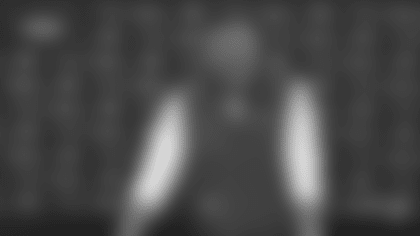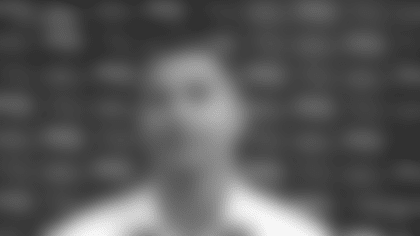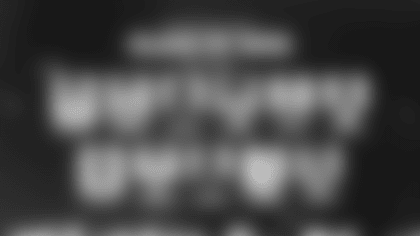[wysifield-embeddedaudio|eid="390231"|type="embeddedaudio"|view_mode="full"]
Q: You guys have been one of the top teams in the league in converting third downs, so what was the cause of your struggles on third down Sunday? Alan Branch was one of the bright spots in that game. What have you seen from him this season?
BB:I think Alan has done a good job for us. I thought he did a good job against Denver, but he's been pretty consistent all year, so it's been good. He's been steady and it's certainly been a big advantage this year with him being able to come in at the beginning and not halfway through the season like he did last year, so that has definitely helped him and us. Third down, well, we've got to try to do a better job.
Q: Was it getting into third-and-long or was there something else that contributed to your struggles in that area?
BB: Yeah, the longer yardage didn't help and then we had quite a few ... I'd say most of them were over third-and-eight or more. That never helps.
Q: What have you seen from Jonathan Freeny this season on defense? He plays a lot on special teams, too, so how do you monitor his usage during the game?
BB: Yeah, first of all, I think he's done a good job for us in the kicking game. We'd love to use him as a core player in the kicking game, but just as you pointed out with his increased role defensively that's something that we have to keep an eye on and just monitor and try to figure out how it's going to go. Last week, when Dont'a Hightower didn't play in the second half, that was kind of an in-game thing that we worked out. Those kinds of things happen during the game. You just have to make whatever adjustments you have to make in-game and then the following week depending on what the situation is, you reevaluate it and make the decisions for the next week. We'll see how that goes going forward, but he's a guy who's done a really good job for us. He has good length, good size, runs well, is tough, is a good strong run player, good tackler and has done a good job for us in the kicking game. He can blitz. He's got, like I said, good length, which is an advantage in coverage. He's got a lot of strong points. I'm glad we have him, glad we have him.
Q: What have you noticed from Patrick Chung that has helped him become a better player?
BB: Patrick has always been really good – smart, works hard, does whatever you ask him to do, understands the team concept and is a versatile player, so he can do a lot of different things, but whatever you ask him to do he embraces it and works at it and does the best he can. Obviously as we all gain experience it helps us going forward when we can build off those, and I think like any player that's played a number of years like he has you learn a little bit every year. I'm sure he has done that the last couple of years, but that was never an issue for him like having trouble learning or assignments or things like that. That's never been an issue with him.
Q: Cris Collinsworth was raving about his coverage skills on the NBC broadcast. Have you always seen him as a good coverage player or has that evolved over the last two years?
BB: No, I think that's always been a strength of his. I can still remember him being matched up against [Wes] Welker in the slot in practice, whether it be one-on-ones or training camp and team drills and that kind of thing. He's always been very competitive as a coverage player, whether it be on tight ends or slot receivers – whatever it happens to be – but he's obviously worked hard at that and continued to get better. We used him in that role probably a little more this year than we have in some other years, even last year for that matter. But he's worked hard at it and he's done a good job. But no, I wouldn't say it's something that we just saw in the spring or anything like that. There are a lot of good examples of him doing that and doing a good job of it, too, during the first time he was here.
Q: Especially for younger players, is there a benefit to playing in close games? Does it help the team overall, too?
BB: There probably is. You learn something from every game. Every game is an opportunity and every game is a learning experience, so whatever that game brings, it brings. Over the course of the season you're probably going to touch all bases somewhere along the line, whether it be weather conditions or close games or playing from ahead, playing from behind, playing on the road, playing at home – all different combinations of those things that all mix together. That's why each game is unique and different and has its own characteristics. Part of your development as a football team is learning to play competitively in those situations. You practice all of them, but when you actually get to play in them you probably learn a little bit more from that. Not that we want to be playing from behind or not that we want to be playing from behind of the road or not that we want to be ... But whatever comes up, comes up, and you've got to learn from it.
Q: Have you noticed someone like Malcom Brown growing from those experiences?
BB: Yeah, there's no doubt about that. It's a huge challenge for all the rookies. The guys that are playing a lot or the guys that maybe even aren't, that have less playing time, but still the preparation, the grind of the season, how competitive it is and all that, it's a lot different than what they've been through. So it's a learning experience for all of them, but at the same time we had all had a first year at some point that we try to learn from. But we try to give them as much help and direction as we can. I'm sure they talk to other veteran players and those guys tell them what they learned or things that they would do differently or whatever advice they could give. That's part of it, too. Our whole team has competed hard and whatever the schedule is, it is, but it certainly hasn't been easy. But it's the National Football League – they're going to be hard. Our team has competed hard, they've practiced hard, they've prepared hard, played hard. We've just got to do a better job of coaching and continue to improve as a football team and see if we can get back on track this week.
Q: Does losing a game help you focus in on areas you need to improve? Also what have you seen from the Eagles offense?
BB:In terms of Philly, it's a really explosive group. They've got great backs, tight ends are really productive, receivers are productive and they've got two good quarterbacks. We played against [Sam] Bradford and we played against [Mark] Sanchez and practiced against Sanchez last year. They really have two starting quarterbacks, they have really three starting running backs, a couple starting tight ends and multiple skill players at receiver, so they can really put two offensive skill groups out there on two different fields and be pretty good. That's a big challenge for us and they're very talented offensively. They can score from anywhere on the field in one or two plays, so it's just hard to keep them contained. As far as our team goes, we treat every game the same. We win a game, but there are still things we need to improve in. We lose a game, there are things we need to improve in and there are things we did well, even though the outcome wasn't what we wanted it to be. You can take one or two plays from that game and have a completely different outcome. Are we going to be sitting here saying everything is great? No. The problems are still the problems. It's one or two plays that changed the way it came out and that's true of some of the games that we've won, too. You change a couple plays in some of the games that we've won and those outcomes might have been different. We're really always looking to try to improve, to try to fix our problems, to try to build on our strengths and there are always things that we have to deal with weekly in terms of making adjustments and fluctuations on the roster and matching up against new opponents and so forth. We always have to deal with that.
Q: What is it about Logan Ryan that allows him to break up so many passes? It seems like he's been very good at getting his hands on balls throughout his career?
BB: Yeah, I agree. I think really he's been good at that his whole career. He was a very productive player in college as well. Again a combination of those things – technique, Logan's got good playing strength, so he can lock on to receivers and not get kind of batted around like sometimes smaller guys do. He's not in that category. He's very instinctive. He has a good grasp of route concepts and overall understanding of the passing game, what the offense is trying to do and how they're trying to attack and combination routes, splits and understanding where his help is in coverage and so forth. I think all those things play into it. I don't think it's any one thing. Each play is different, but Logan studies hard, he prepares well, he does a good job with the communication so that he and his teammates are on the same page with the coverage adjustment or a coverage technique to play it properly so that everybody can do their job. Those are all strengths that he has. He's a very mature kid who was well coached in college, so he came here with a good background and a good understanding and has worked hard to build on that.
[wysifield-embeddedaudio|eid="390236"|type="embeddedaudio"|view_mode="full"]
PATRIOTS OFFENSIVE COORDINATOR JOSH MCDANIELS CONFERENCE CALL
Q: Why do you think the Patriots struggled on third down on Sunday? What do you think of Scott Chandler right now? Will his role change? How?
JM:The third downs, first of all, credit Denver. They're a very good defense on all downs, and they do a tremendous job on third down as well of trying to play tight coverage, and they've got a good rush. And there are a lot of factors that go into having success there, and they did a better job than we did on Sunday night. I think the big thing for us is to try to eliminate all the third-and-longs. I think we had 10 of our 13 or 15 third downs were third down and eight or nine or more. And that goes back to just overall production and efficiency on first and second down and trying to stay out of those long yardage situations, which are certainly by percentage a lot more difficult to convert than the third and shorts. I think it's all tied together. What you're doing on first and second down certainly affects your ability to succeed on third down. And we can coach better, and hopefully, we can execute better to put ourselves in better situations. Scott made some plays for us the other night. He's done that off and on during the course of the year. When we've called on him and needed him to do some things and asked him to make some plays in critical situations, he's stepped up and done that for us and did it again the other night. He's a talented guy. He's always been a guy who could produce in the middle of the field, down the field on some vertical-type plays and in the red area. So he did that again for us the other night. We've been happy with the things he's been able to give us, and if his role expands here a little bit as we come down the stretch, then I'm sure he'll be ready to handle that.
Q: Do you feel comfortable using Chandler in similar ways that you would use Rob Gronkowski?
JM: I think Rob is a very unique player, and it would be difficult for anybody to come in and do the same exact things that Rob does in any capacity. I think that we have some guys in the skilled group that we try to put in positions where we feel like those are things that they do well, whether that be the receivers, the tight ends or the running backs. And if it's not something where we feel comfortable with them or they don't feel comfortable doing it, then we're going to try to do as many things that fit the personnel we have on a week-to-week basis as we can. So Rob certainly has a broad spectrum of things that he allows us to do, and other players have different unique skillsets that we try to utilize as well. But I don't think there are really any two players that are the same, and when you're comparing and contrasting, I think that's difficult to do. But we're going to try to do the best we can with everybody that we have, put them in the right positions to be able to make the plays that they certainly can make.
Q: What do you see in the Eagles defense?
JM:I think it's a very aggressive group. I know Coach [Billy] Davis. We worked against him in training camp a few years in a row, you know, '13 and '14. And this is a group that plays really hard, has a lot of high motor, high effort players at all three levels, very disruptive front, very athletic and unique type of linebacking corps. I mean, they've got some guys with length and power on the edge. They've got some guys with great speed and quickness inside and great instincts. They've got a really good group there at the linebacking group, and then their secondary is a group that is very instinctive, makes a lot of plays. They've intercepted quite a few balls. They get their hands on or around a lot of footballs, and they take advantage of a lot of bad plays or sloppy plays in the passing game. So they win with turnovers, and they're the third-best team in the league I think at this point in terms of creating turnovers. We're going to have to do a great job of protecting the football. They give you a lot of different looks. Line up in a lot of different alignments. [There are] a lot of different pressure variations that they utilize that create problems for the offense and get to the quarterback, and they create a lot of negative plays. So we're going to have to do a good job of handling the variations and the different schemes that they use. We're going to have to do a good job of trying to minimize negative plays because they've got a really disruptive front that can create a lot of problems for you if you're not careful, and then we've got to do a great job of taking care of the ball because this is one of the best teams we've played all year at getting it off the offense. So big challenge, team that we don't know real well in terms of having played them in the regular season that we're going to have to do a great job of getting familiar with really quickly and hopefully have a great week of preparation so we're ready to go on Sunday.
Q: You guys always say that you can't control the calls, but you can control how well you know the rules. What is Rob Gronkowski doing that keeps drawing the offensive pass interference fouls? How do you handle that situation going forward?
JM:Yeah, you're right about not being able to control the calls. I mean, they are what they are, and we have to play within the rules. I think that the best thing we can do is try to coach Rob based on the way that we've been told we can play. Rob very rarely, if ever, extends his arms, and we try to make sure that we don't do that. And I think that we try to make sure that we're not the one that's pushing or shoving or shoving or trying to move the defender in any way that's illegal. So I think a lot of time, the contact is initiated, and the question is who's initiating it. And we're fortunate to have a guy who is a big athlete and is bigger than the guys who are covering him, and at times I think sometimes we feel like the contact is made and because the other guy takes the brunt of it, sometimes we end up getting called for it. But you know, I think Rob is trying to play within the rules 100 percent of the time. We're never trying to do something that would create penalties, and we certainly are going to try to do everything we can to eliminate those penalties going forward because they certainly come at big times in the game and they affected a couple of drives the other night. We'll do everything we can to try to clean that up and help Rob and anybody else for that matter because we've been called for a few other ones along the way, too, to try to avoid those things coming up again.
Q: What are you seeing from your run game? Is it the product of not getting the momentum going in the run game?
JM:It's certainly an area that we would like to improve in, along with a lot of other things we can do better. I think any successful area of your offense goes back to everybody being connected and doing their job and executing their assignment properly on that play to give the scheme, whatever the play is, an opportunity to be successful. And there are certainly things that we can do as coaches to help put our guys in better positions or in the best positions we can put them in, and then we've got to be connected together to do our job and give the runs an opportunity to get started. The other night, again credit them, they're a very good defense, got a good scheme. It's not all one reason or another. We can do better and we need to and that's what we're going to work hard to do this week.
Q: What have you seen from Joey Iosefa on your practice squad? The fullback position is kind of being phased out of the college game. How does that impact the way you work with a guy who doesn't have experience in that position when you're trying to transition him?
JM:Joey is a guy who works hard. On the practice squad, you get exposure to a lot of different roles. You may play fullback, you may play halfback, tight end, sub back. You need to be able to block, run the ball, catch the ball out of the backfield. So he's in the process of just learning and adapting to our offense and then servicing us in as many roles as possible while he's doing that so that hopefully he can grow in our system and prepare himself to be ready to go if we need him going forward, which is really what we try to do with all of our practice squad players. [He's] got a great attitude, got a good work ethic, comes to work every day, gives us everything he has. I like the way that he's progressing, and we'll see where it goes. The fullback position in general, you're right about that. There's not, you don't see too many offenses, when you start to prepare for the draft and those types of things as you study college tape, that utilize a fullback a lot. And I think some of the ones that do, you get a good look at those guys. And if you're ever trying to convert a player from a certain position to another one, you've got to give yourself some time to do that, you've got to give the player an opportunity to adjust and adapt to the new position you may be asking him to play. So I know James Develin was a defensive lineman in college and then happened to, ended up with Cincinnati I believe, and then we end up having them. It took James, I think a little bit of time, just to get the nuances of the position. And we've certainly had players who have played offense and defense and changed positions from what they did in college, and I think the critical thing is hopefully you've identified the traits and the skills that you're looking for so that the position is a fit for the person. And then you've got to give him an opportunity to grow into the role because certainly with no experience or exposure to it, it's difficult to step right in and do everything right. So as coaches, you've got to demonstrate patience. You've got to do a good job of teaching the finer details to a person who hasn't had that exposure or experience in college or in high school and let him show you that he has the ability to learn it and to improve in that role and hopefully be productive in it.
[wysifield-embeddedaudio|eid="390241"|type="embeddedaudio"|view_mode="full"]
PATRIOTS DEFENSIVE COORDINATOR MATT PATRICIA CONFERENCE CALL
Q: What challenges does the Philadelphia Eagles offense present to you?
MP:Well, obviously you have a very dynamic, explosive, skill group here. They do a great job of playing the space game or spreading you out, trying to run the ball, quick throws. I think they do a really good job of the tempo – obviously, is a big key to what they're trying to do – so going fast, trying to get lined up quick, trying to catch the defense off guard. I think their overall operation is excellent. They do a great job with it. It's one of the hardest things to get ready for, to get that game tempo, and speed, and pace that they're going to go at. I think the running backs are obviously very dynamic. [DeMarco] Murray, [Darren] Sproles, [Ryan] Mathews – all of them big play guys – can turn little gains into big gains, very explosive, homerun-hitter-type backs both in the run game and the pass game. They're going to get them out in space. They're going to get the ball to them quickly and allow them to operate and make guys miss in open fields with tackling and things like that. The tight ends are a huge part of what they try to do. You'll see all of them – [Brent] Celek, [Zach] Ertz and [Trey] Burton – all of them will be out there. Both have vertical ability, can really stretch it vertical through the middle of the defense or on the perimeter plus they're very involved with the passing game as far as the quick passing game where they get to their routes quick, sit down, find open space in zones or work leverage off man coverage. Big targets, big catch radiuses so those guys are tough to match up. Then obviously the receivers, they do a good job of complementing the running backs and the tight ends. [Jordan] Matthews, you'll see him inside and does a good job of running the over-routes and kind of that intermediate area of creating those big plays along with [Riley] Cooper. They just do a really good job within that scheme, within the offense, they play fast, they play quick. They really stress you from that standpoint and again try and stretch the game from a horizontal and vertical standpoint.
Q: What has stood out to you about Patrick Chung in his second stint with the team?
MP:Well I think with Patrick, he does a great job of coming in and working very hard every day. I would say as a player in general the longer you're in the league and the more experience you have with one system – or in his case back with our system – you learn a lot more of the details, the intricacies of what we're trying to do and the concepts of what we're trying to get done. I think just the experience that he's gaining through his years in the league has helped him to develop as a player. He's always had a really good skill set. He's always been very smart. His work ethic has been great. He's just trying to improve himself every day that he comes in here. He's trying to get better, trying to learn through experience as far as things that he does through his preparations and his opponents.
Q: What improvements have you seen from Jonathan Freeny as his role has increased?
MP:Well, like every week, all of our guys that are active for the game are ready to go and they're ready to play as many snaps as they need to play. I think Jonathan has done a great job of trying to learn our system and come in and understand how we want to play the defense and the overall command of the defense. From a conceptual standpoint as a linebacker in our system it's very important you understand where everybody lines up, sits, plays, how it affects the defense, the adjustments, the communication, all of those things that you have to handle from a linebacker standpoint. He's done a good job of growing in that role throughout the year and really understanding from a confidence standpoint where you need to be, where your help is, how to use your leverage and things like that. He's doing a great job of trying to come in and learn and improve every day.
Q: How big of a role does confidence play in regard to the cornerback position, in particular Logan Ryan?
MP:Well, with Logan, he's really done a good job of improving and trying to take our techniques and what we're trying to teach him and get better. He does a great job of studying the opponent. He's a smart guy, a smart player. [He] understands the guys that he's up against, what their strengths, what their weaknesses are. [He] has a good background and was coached well at the collegiate level and I think that's transferred over with his work ethic and his ability to come in and grind and trying to get better each week. Just overall really good work ethic and trying to improve and trying to get better, trying to understand the position, trying to understand the concepts, smart enough to move around and play a lot of different roles which I think helps you from a standpoint of playing perimeter, if you've played inside, if you've played in the deep part of the field and transfer that to understanding how to help yourself when you're on the perimeter. I think that's all a big advantage for you as a corner. I would say in general, confidence is a big part of the game no matter what position you're going to play and I think you have to have that confidence in your ability and confidence in what we're trying to do for that particular game and that's what we do during the week – is try to build that confidence up – that when we step out on the field on Sunday that we have a lot of confidence in what we're trying to do and how we're trying to do it and we can execute it at a high level. I think that's not position specific. I think it gets highlighted in situations where if there's a big play or a penalty or something like that then obviously it's easy to go to that position and pick that guy out. It's no different than for the most part of the game you never hear of the offensive lineman but as soon as there's a holding call it's a first down and they call their number all game. We don't really focus on that. It's not a big part of what we're talking about. We're just talking about having confidence in what we're doing, the techniques, the game plan, our ability to understand what the offense is doing. That's really what we try to focus on.
Q: Now that he has been in the system for a year what has impressed you about Alan Branch?
MP:Well, having him here for a little while and being through an offseason and training camp, I think he's just really tried to improve himself through the course of the year and really take a role where he's come to work every day and tried to improve and tried to improve as the season goes on. [He] really does a great job in the meetings. He's very professional, wants the information, wants to be better, wants to learn, wants to really grow as a player. I think he is understanding what we're trying to do and our techniques. Obviously it's helped to have him here for more than half of a season. Being here from the start and what we're teaching and things like that has definitely benefited in there. [He] really just does a great job day-in, day-out of understanding that we're trying to improve and get better and for a guy that's been in the league a while he has a good, young approach to it and really attacks it that way.
Q: Is there a difference in the way Sam Bradford and Mark Sanchez execute the offense and do they present different kind of problems?
MP:I think the quarterback position is definitely key for this offense. It's something that I think Coach [Chip] Kelly and Coach [Pat] Shurmur really put a lot of responsibility on that positon. I think both of them have done a good job of running it, but you know, from the standpoint of the offense I think it is a system. I think it's about the concepts and what they're trying to do and get the ball to their skill players and go fast, so I think the quarterback is just another part of that system. I think both of them have good mobility, they both can move in the pocket, they both can run if they have to, they both can create and extend plays, both of them have good arm strength and they can make the throws and get the ball downfield or get it out on time. They both fit as far as what they're looking for in that system from the offense. They're both smart guys and can understand and operate at a quick tempo. I think both of them are doing a great job as far as running it. I think you've got to be ready for both of them and just prepare for the system itself. I think they're both trying to operate at a high efficiency level of what they're looking for.
Q: Do you think Bradford adjusted well to the offense when he came into it?
MP:Yeah, I think he's doing a good job in the offense and like I said distributing the ball. The ball is getting out, and it's getting around to a lot of their skill players. I think from a quarterback standpoint he's not trying to hold it or create things that aren't there. He's just trying to get the ball out to the guys that he thinks can make plays based on what they're trying to get done for that particular game.







































